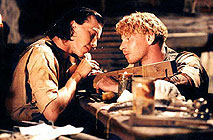|
|
|
|
Brother
of Sleep
|
 |
|
The reviewer who was moved to describe Brother of Sleep as "a German Shine" deserves the Promotional Disinformation award of 1997. This strange, overwrought film is more like a cross between The Tin Drum (1979) and Breaking the Waves (1996) – with touches of Eraserhead (1978), Werner Herzog and Geoffrey Wright thrown in for good measure. Shot and directed by Joseph Vilsmaier (later to score success with a lighter film also on a musical theme, The Comedian Harmonists [1998]), Brother of Sleep is a tale of tormented, visionary genius – or, since an each-way-bet ambiguity is the order of the day here, the tale of a mad, deluded fool. As a child, Elias (Conradin Blum) is lonely, sensitive, mocked by the coarse townspeople around him. He is racked by aural hallucinations of the entire natural world gathering into a vast, resounding crescendo. As an adult (André Eisermann), Elias flirts with the intense, downtrodden Elsbeth (Dana Vávrová) and continues his fairly homo-erotic friendship with the troubled Peter (Ben Becker). Switching his musical proclivities from vocals to keyboards, Elias also becomes the Rick Wakeman of the 19th century – playing cornily eerie synthesizer themes to rapt church crowds. Brother of Sleep is steeped in references to the tradition of the Sublime in art – and its many sweeping landscape vistas, poised between great beauty and horrific menace, are its most impressive feature. But it is hard to tell, finally, what Robert Schneider's adaptation of his own novel is really on about, beyond merely plunging us into a churning, kitsch sea of Ken Russell-style apparitions and grotesque depictions of family life. © Adrian Martin June 1997 |
![]()